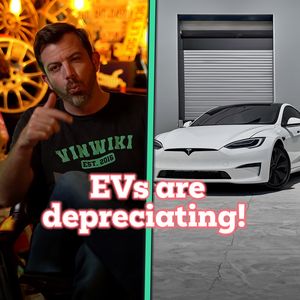-
Discussions tagged with 'Auto Depreciation'
-
Here’s a great
informative video clip from VINWiki about car Depreciation the minute you drive it off the auto dealership. Electric cars, like all vehicles, experience depreciation, but there are specific factors that influence the rate at which they lose value. Here’s an overview of how electric cars depreciate and the factors affecting their depreciation rates:
Factors Influencing Depreciation of Electric Cars
-
Battery Life and Technology:
- Battery Degradation: The lifespan and efficiency of the battery are critical. Over time, batteries lose their ability to hold a full charge, which can decrease the car’s range and performance.
- Technological Advances: Rapid advancements in battery technology and electric vehicle (EV) features can make older models obsolete faster than traditional vehicles.
-
Government Incentives:
- Tax Credits and Rebates: Federal and state incentives for new electric car purchases can reduce the initial cost, but these incentives don’t apply to used cars, which can affect resale values.
- Policy Changes: Changes in government policies regarding incentives can also impact the depreciation rates.
-
Brand and Model Perception:
- Brand Reputation: Brands with a strong reputation for quality and reliability tend to depreciate more slowly.
- Model Popularity: Highly popular models with good reviews and strong market demand retain their value better.
-
Market Demand:
- Consumer Preferences: As consumer interest in EVs grows, demand for used electric cars can help stabilize depreciation rates.
- Resale Market: A well-established resale market can positively impact depreciation rates.
-
Mileage and Usage:
- Lower Running Costs: EVs typically have lower running costs, which can make them more appealing on the used market.
- Usage Patterns: How the car has been used (e.g., city vs. highway driving) and overall mileage will affect its resale value.
Depreciation Rates Comparison
Electric vs. Gasoline Cars:
- Higher Initial Depreciation: Electric cars generally depreciate faster initially compared to gasoline cars. This is partly due to the high cost of the battery and rapid technological advancements.
- Long-term Trends: Over time, as the market for electric vehicles matures and battery technology stabilizes, depreciation rates for EVs may become more comparable to those of traditional vehicles.
Examples and Data
Tesla:
- Model S and Model 3: Tesla vehicles, particularly the Model S and Model 3, have shown better-than-average resale values compared to other electric cars. This is attributed to Tesla’s strong brand reputation, continuous software updates, and high consumer demand .
Nissan Leaf:
- Rapid Depreciation: The Nissan Leaf, one of the earlier mainstream electric cars, has experienced rapid depreciation. Factors include its older battery technology and the availability of newer, more advanced EV models .
Conclusion
Electric cars depreciate due to factors such as battery life, technological advancements, government incentives, brand reputation, and market demand. While they may depreciate faster initially compared to gasoline cars, certain models, like those from Tesla, tend to retain their value better. As the market for electric vehicles continues to evolve, these depreciation trends may change.
https://www.facebook.com/share/v/e8d3zYemG5W6wwrG/?mibextid=D5vuiz
-
This discussion was modified 1 year ago by
 Gustan Cho.
Gustan Cho.
facebook.com
Market Insights on the Values of High-End EVs!
-
Viewing 1 of 1 discussions

